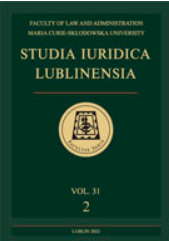The Admissibility of a Complaint against Inaction and Prolixity Despite the Ending of Administrative Proceedings
The Admissibility of a Complaint against Inaction and Prolixity Despite the Ending of Administrative Proceedings
Author(s): Joanna SmarżSubject(s): Law, Constitution, Jurisprudence, Administrative Law
Published by: Wydawnictwo Naukowe Uniwersytetu Marii Curie-Sklodowskiej
Keywords: inaction; prolixity; call to action; complaint to an administrative court
Summary/Abstract: A discerning and quick handling of a case is the duty of an authority conducting administrative proceedings. If this duty is breached, a party has the right to present a call to action and a complaint to an administrative court against inaction or prolix proceedings. A doubt arises in connection with this regulation, however, if the submission of a complaint against inaction and prolixity at the end of proceedings and following the issue of an effective decision prevents an administrative court from considering such a complaint on its merits in the light of Article 149 § 1 (3) of the Law on Proceedings before Administrative Courts. The doubts have not been dispelled by the recent amendments to the Administrative Procedure Code and the Law on Proceedings before Administrative Courts in 2017 or a resolution of the panel of seven judges of the Supreme Administrative Court (II OPS 5/19), to which dissenting opinions were submitted. The Supreme Administrative Court has therefore made another resolution (II OPS 1/21) in order to clarify and reinforce the former. It is difficult to agree with the interpretation arising from these resolutions since they restrict a party’s right to seek their rights in court. The universal binding force of the resolution must be borne in mind, though, as it binds administrative court judges until the interpretation of a given provision is varied by another resolution.
Journal: Studia Iuridica Lublinensia
- Issue Year: 31/2022
- Issue No: 4
- Page Range: 255-274
- Page Count: 20
- Language: English

